As I said before, Spider-Man used to be my favorite comic characters. As such, I wanted to learn as much as possible about the character, which led me to start reading issues of his original run beginning in the 60’s. What always struck me about these issues was the irreverence; no other heroes from this era had the flippancy that made The Amazing Spider-Man such a great read. Despite being a generally good kid, Peter could be a real douche sometimes.
For this post, I wanted to focus on a comic story that I particularly enjoyed when I first read it. It takes place in The Amazing Spiderman #8 (1964). As you can see, the cover shows that this issue is chock full of stories; Peter boxes his rival Flash Thompson and battles a spiffy robot. Fuck those stories, I don’t care about them. What i’m talking about is the story that dwarfs those two, namely “Spider-Man Tackles The Human Torch” (and we ain’t talking about football). As I mentioned before, this was a common sales tactic, everyone loves a dust-up between two heroes, and Spidey and Torch make excellent candidates. At this point in time, Spider-Man and The Fantastic Four were the DEFINITIVE Marvel titles, meaning that combining the two franchises was a sure fire hit. As such, crossovers abounded, but eventually The Human Torch became Spidey’s particular rival given their teenage-ness and cocky attitudes. What made their rivalry even better was that whereas Spidey was so disliked that he was often considered a criminal, Torch was beloved by everyone. So beloved is he that he has a huge birthday party with loads of ladies and stuff, which leads us to our story.
One of the first things I love about this comic is that there is NO LEAD UP WHATSOEVER. To be fair, the two had a rivalry for awhile, but it was only when they ran into each other. In this issue, Spidey actively harasses him by showing up and fucking up his birthday like it was his job. And maybe bone his girlfriend. Peter’s portrayal here is vastly different than most iterations, which often make him a paragon of morals. While Spidey’s no Punisher, here he shows what made him one of comics’ first anti-heroes. Anyone who’s read Amazing Fantasy #15 knows that Peter has a burning desire for respect.
His peers mock him and women avert their eyes in his presence, which manages to carry over into his superhero career as well. As such, he’s sometimes portrayed as starved for recognition. Here we see that he’s so envious that he’d do something as petty as ruining a birthday party just because he can’t have one.
The Amazing Spider-Man #21 (1965)
The Torch isn’t just more popular than Spidey, he’s also the establishment hero that he could never be. The Fantastic Four, as Marvel’s “first family”, defined being a superhero in the marvel universe, so Torch was by extension a major hero. He had all of the benefits Golden Age superheroes were supposed to have; money, women, and public admiration. Ironically, The Torch’s notable lack of a traditional secret identity also makes him more of a superhero to the people, since the public harbors no distrust against him in the same way as Spidey, who’s masked appearance is consistently said to be “creepy” in universe.
Upon seeing Torch’s fiery display, Spidey calls the kid a “phony” and views his “heroics” as more pompous than purposeful. Given that his powers involve wreathing himself in flame, that shouldn’t come as a surprise. This of course comes off as a bit hypocritical coming from SPIDERMAN of all people, who responds by making an entire bat out of web and throwing it at the partygoers. Having got the man’s attention, he decides to swag in assholishly and talk some good shit. Unsurprisingly, no one reacts with “HOLY SHIT IT’S SPIDERMAN!!!”, and instead act like he’s the paste eating kid in grade school. Mind you, this is still very recent into The Amazing Spider-Man‘s run, so everyone instinctively reacts with hatred towards the poor lad. This went back and forth throughout the series, since seemingly everyone on in Peter’s high school seemed to like Spidey just fine. Since the kids in this particular comic are Torch’s friends, one can assume they are as much “establishment” as he is, so they wouldn’t share other teens’ sentiments. This dynamic makes Pete more sympathetic in the story, since he does deserve some respect for his heroism, even if he did just pull a prank.
Spidey takes their rejection in stride, causing Torch to create some lame-ass comebacks, including calling Spidey a “rusty crutch”. I often wonder if people in the 60’s really spoke this way or was Stan Lee just fucking around. Spidey isn’t amused by this either, and continues to mock the lad. Once again, we see a nice distinction between the two: Torch is a “square” who uses crappy jokes as opposed to the hip Spidey, who knows how to smack talk with the best. Granted, much of this is due to the fact that this is a Spider-Man story and not a Fantastic Four one, but generally Torch isn’t that funny anyway. Despite the fact that Torch has more social approval, he’s not nearly as entertaining as the irreverent Spidey, who we as the audience like more in this match up. Torch gets so angry at Spidey that they get into an actual fight outside of the building.
Spidey almost gives up the fight, until Mr. Fantastic, rather innocently, offers a hand to help, which Spidey takes offense to and attacks him as well. Obviously the rest of the Four intervene as well. This isn’t the first time a fight has broken out among these characters; the first issue of his Spidey’s series has him fighting the Four for the first time.
For some reason, in both issues he takes offense to Reed and Sue’s offers of help, as if the very idea that he needs it is insulting. This streak of independence is probably why Spider-Man was never integrated that much into the Avengers franchise; so much of his character is defined by him struggling alone, which joining a super-group would subvert.
His rampage against the Four is stopped rather unexpectedly by the Invisible Woman, who flirts heavily with him because she is a woman and that’s what Stan Lee thinks women do. He reciprocates by giving her a web-heart and making fun of the team once again. Our hero! This issue is similar to a much more recent issue of Deadpool, where the titular character picked a fight with Wolverine for the hell of it.
Deadpool #94
Obviously, while I wouldn’t compare Wolverine THAT MUCH to the Human Torch, one thing they do have in common in their respective issues is that they are Marvel mainstays being accosted by cocky upstarts. Wolverine is a hero known worldwide, respected by pretty much any hero worth a damn. Deadpool is an insane idiot who’s made fun of in this issue by fucking SHADOWCAT, a barely relevant X-Man. Both of these issues illustrate how these characters fit into the larger Marvel universe and what makes them anti-heroes.
Whereas the term “anti-hero” has become synonymous with excessive guns and gruffness (i.e. Cable), anti-heroes in the classical literary sense are those who are impotent and ineffectual. Spidey and Deadpool are the guys who are at the low end of the totem pole; the George Costanzas of superheroes. Just as George Costanza is the man nobody wants to admit they are, Spidey is the hero no one would like to think they would be. Sure, he still performs all the duties expected of him as a cape, but he still has the same problems you and I have. On top of that, he doesn’t always deal with them in the most mature manner. For example, whereas most heroes are dead-set on their lifestyle, Spidey contemplates quitting anytime a personal complication arises. As seen in his battle with the Torch, his seemingly carefree demeanor belies his tempestuous mind, which could be prone to rash decisions. In one of the series’ most famous issues, he quits being Spider-Man all together due to a verbal berating by J. Jonah Jameson on how he should get his life together.
The Amazing Spider-Man #50 (1967)
Whereas for most people, “getting your life together” could mean starting a 401k, for Spidey this means…
Unsurprisingly, quitting has been a recurring event in the franchise, even extending to the film Spider-Man 2 , where he quits due to losing Mary Jane to another man. Speaking of women (and this may come as a surprise for modern fans), Peter had SEVERAL girlfriends during his series, including a co-worker at the Daily Bugle (Betty Brant), a high school cheerleader (Liz Allan), an Ivy League former cheerleader(Gwen Stacy), a hot cat-burglar (Black Cat),another Ivy Leaguer (Debra Whitman) and his one-time roommate (Carlie Cooper). He fucked up all of these relationships, just because he’s Spider-Man. Compare this to Superman, the Flashes, and pretty much any other hero who manages to maintain a relationship no matter what. Peter, not so much.
What’s so great about “Spider-Man Tackles The Human Torch” is that it manages to establish just what isn’t heroic about Peter quite succinctly. The people don’t support him, he doesn’t get the girl, other heroes think of him as at best inconsequential and at worst, a pest. And what’s also great is that he acknowledges it. Acknowledgement can sometimes mean a snappy comeback to his detractors, and sometimes it can mean unwarranted aggression (as we see when he attacks Mr. Fantastic). Attributes like this is what made Spider-Man so resonant in the 60’s.
In 1965 Esquire had a college student poll that revealed that student radicals ranked Spider-Man and the Hulk alongside the likes of Bob Dylan and Che Guevara as their favorite revolutionary icons. What made such Spidey such a counter-culture hero was because his readership had the same frustrations he had. He was akin to a James Dean character, trying to fight against the ever-present enemy of society. He neither is accepted by others or accepts others himself, leading him to conflict even with those who don’t wish him harm. Teens had been dealing with sexual frustration and resentment towards authority for years, but this was one of the first superhero franchises that acknowledged it. Spidey’s “tackling” of the Human Torch (and later on the Fantastic Four)represented a confrontation with the “establishment”. Superheroes were meant to be wish fulfillment figures, but that also meant they were often aloof and unrelatable. Despite being young himself, the Human Torch and his allies are very much the detached authority figures that look down upon someone like Spidey. While the Four aren’t “villains” per se, they are the type of heroes “new age” characters like Spider-Man had to differentiate themselves from in order to connect with the sentiments of the audience. As such, conflicts like this helped to illustrate just why Spider-Man has continued to have an impact on several generations of youth.
For a more in-depth look at Spidey’s origin story:
Throwback Recap: Peter Parker from Amazing Fantasy to Amazing Spider-Man
For more posts on Marvel heroes:
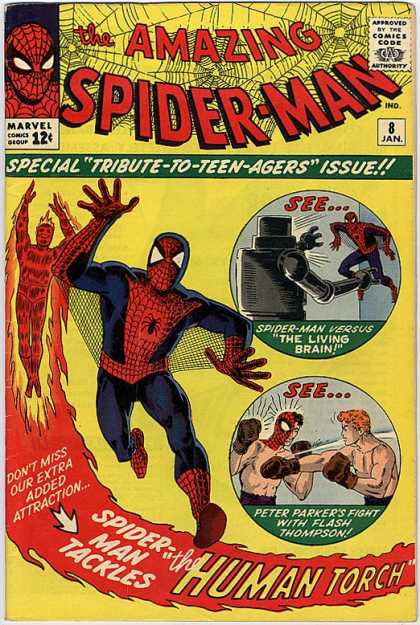
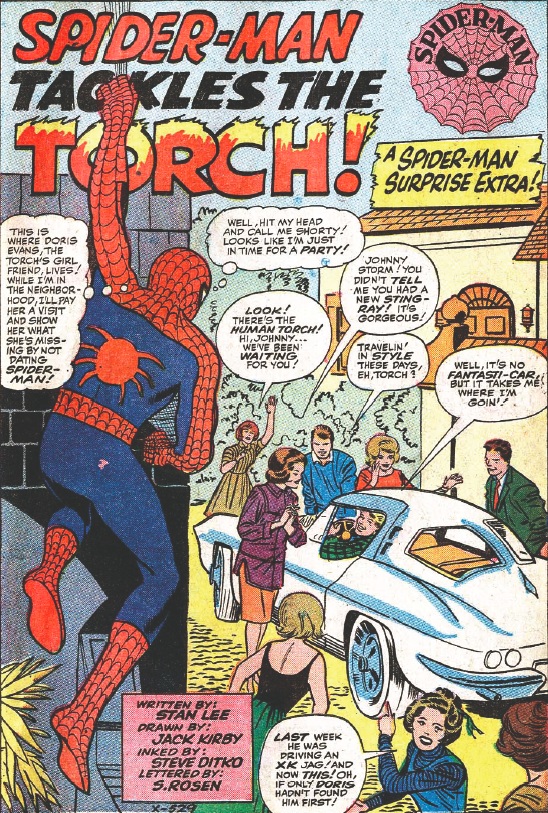
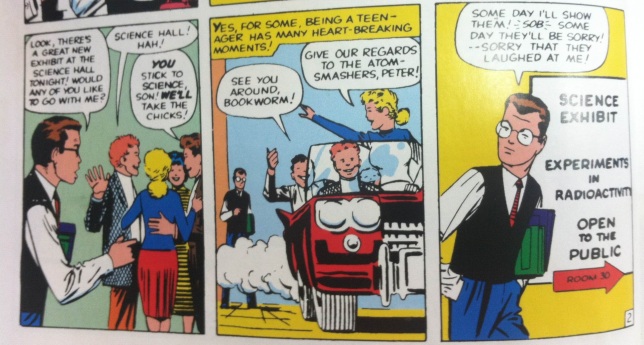
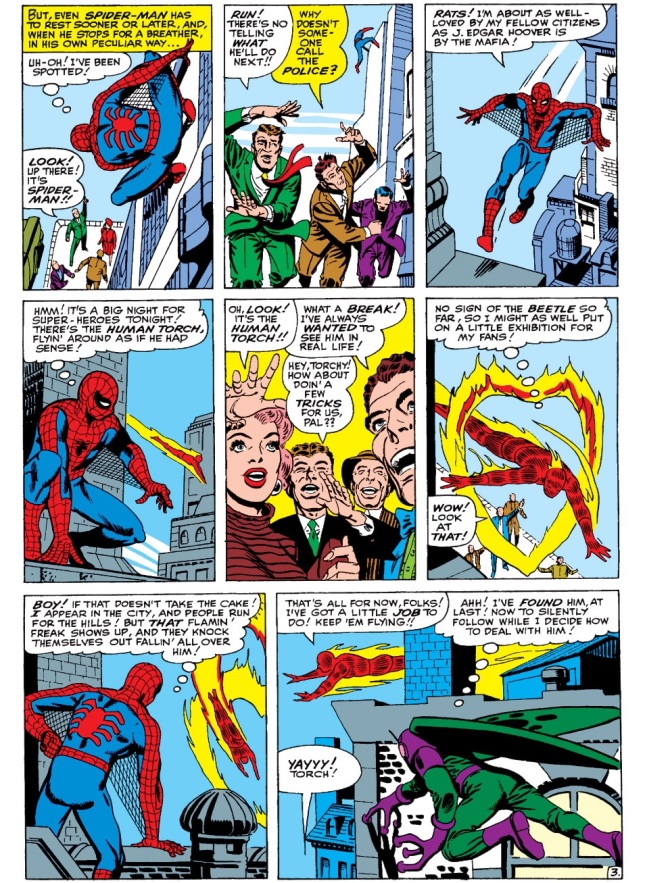
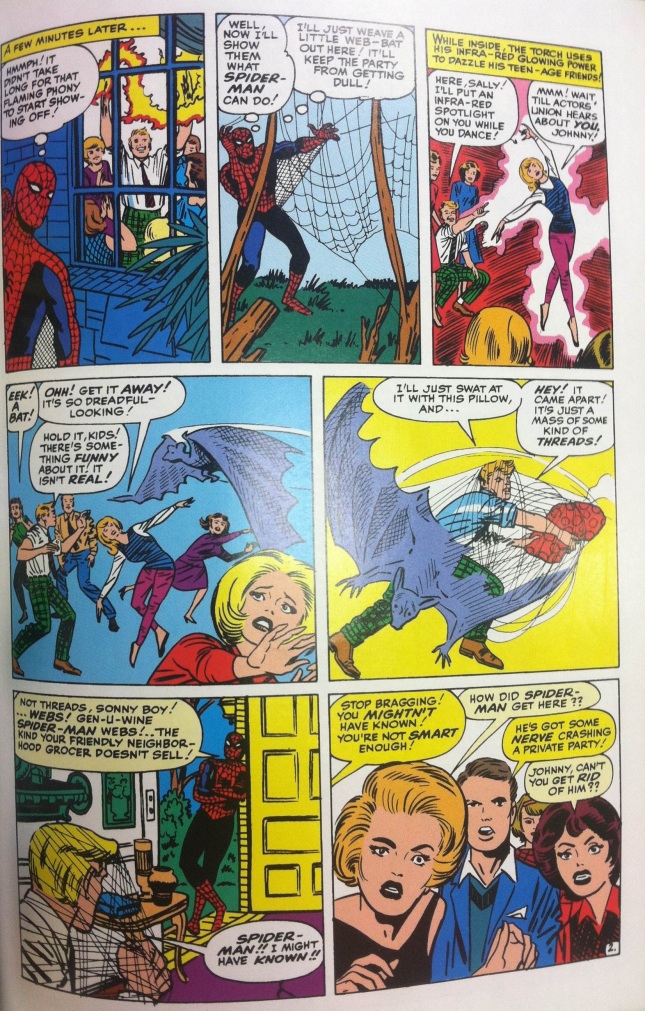
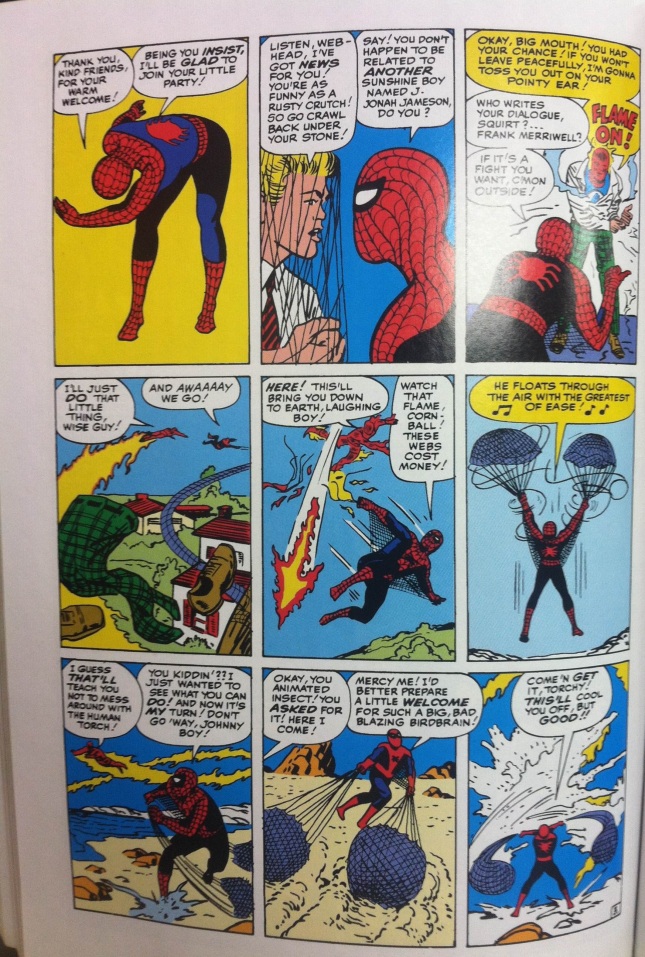
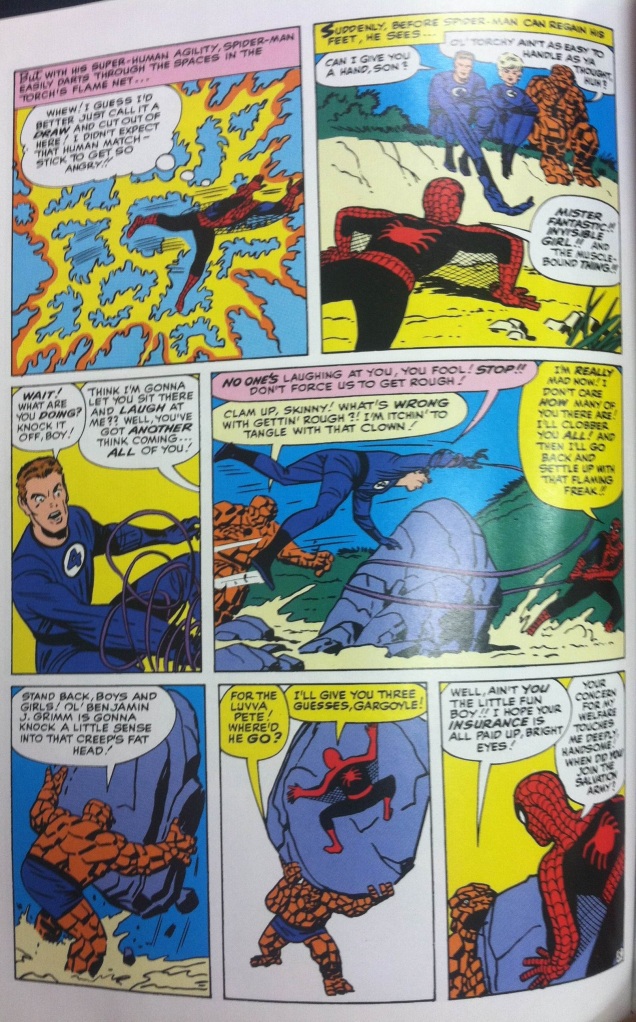

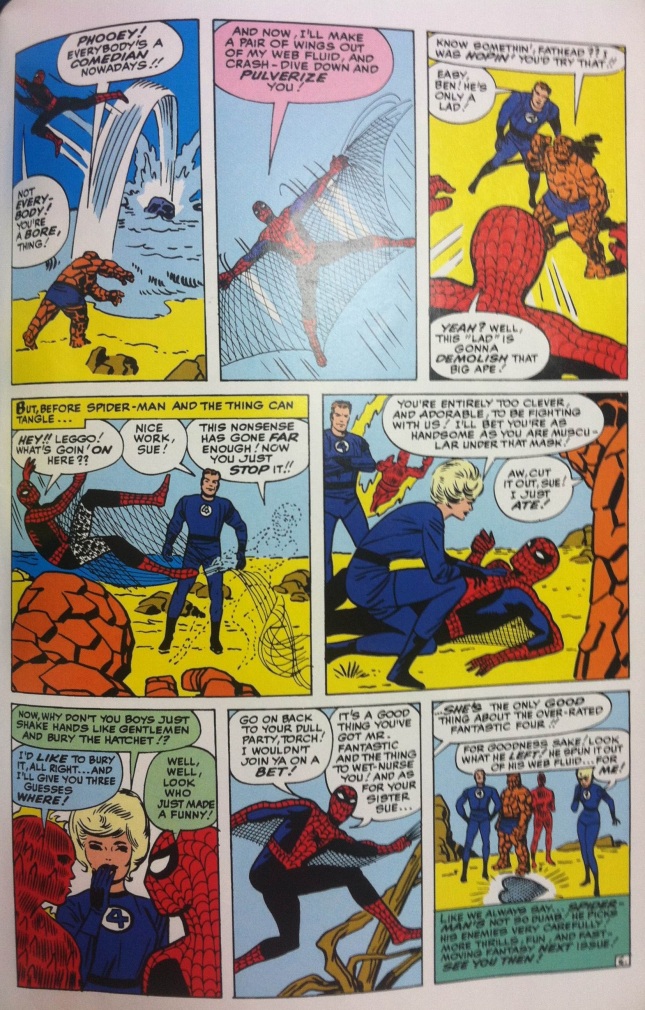
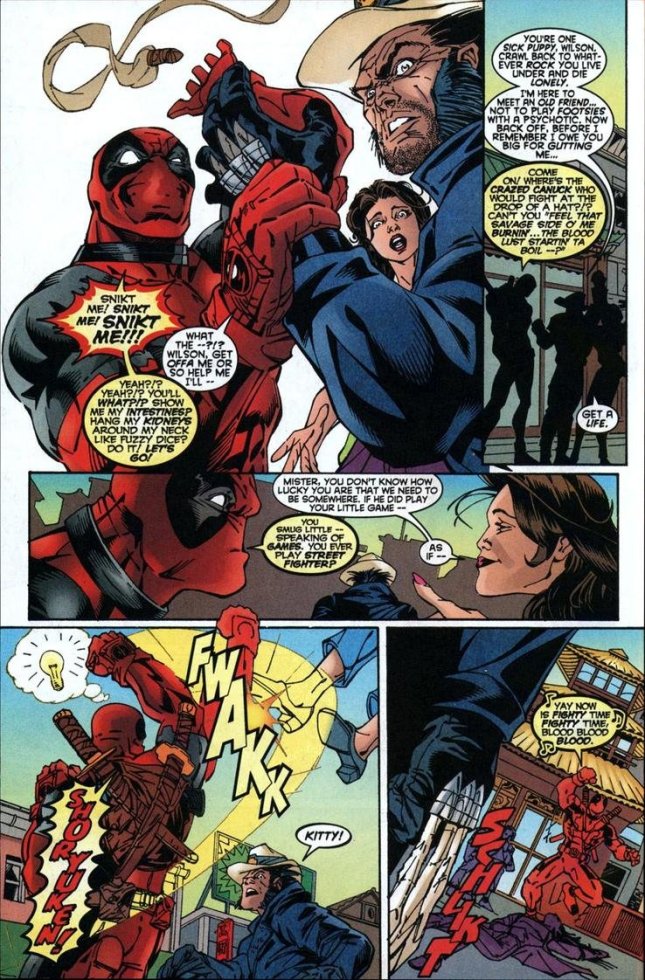
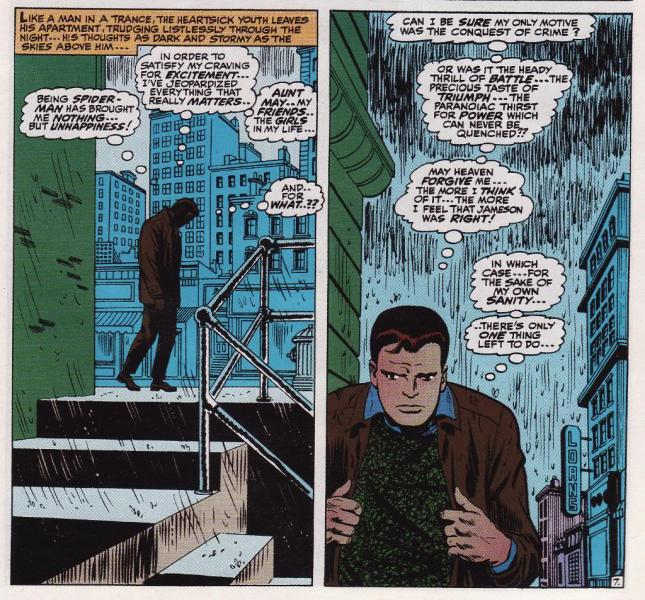
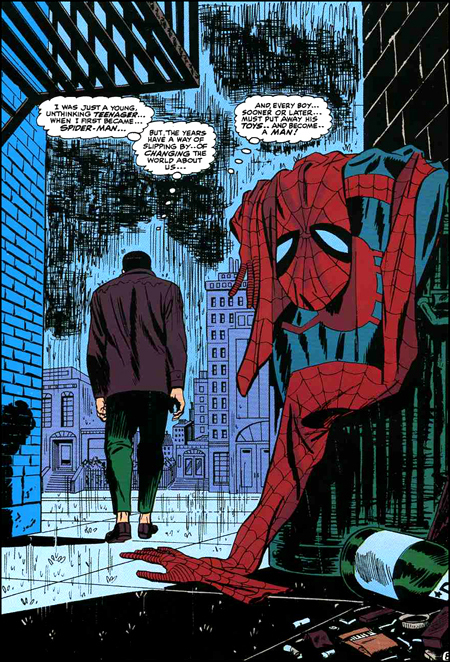
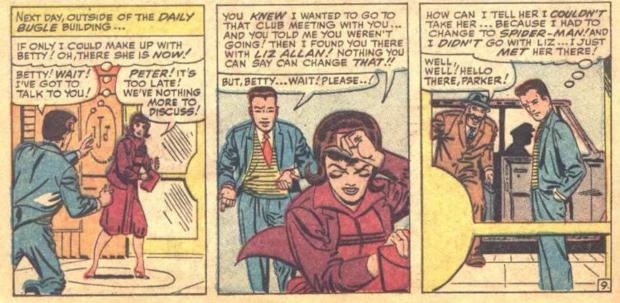
Pingback: Throwback Recap:Peter Parker from Amazing Fantasy to Amazing Spider-Man | World Within Logos
Pingback: Flash:The Quintessential Superhero | World Within Logos
Pingback: From Comic to TV:Green Arrow as Adapted Into CW’s “Arrow” | World Within Logos
Pingback: Batman as a Heroic Psychopath | World Within Logos
Pingback: Iron Man: Real American Hero | World Within Logos
Pingback: Three Forms Of Comedy As Seen Through Justice League | World Within Logos
Pingback: Thor: The Dark World Review | World Within Logos
Pingback: The Lois Lane Effect | World Within Logos
Pingback: Hoverboy: The Most Racist Superhero Ever | World Within Logos
this means that the nightcrawler and an anti hero also